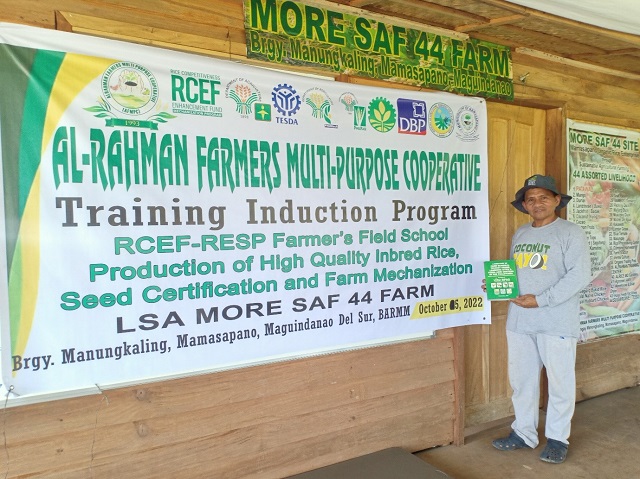
In a village in Mamasapano, Maguindanao, the fear caused by an unfortunate event here seven years ago is now supplanted with faith that farmers can improve their lives; thanks to an opportunity opened up by the Villar Sipag Foundation and maintained by the Rice Competitiveness Enhancement Fund (RCEF).
Modrika A. Masukat, owner of MORE SAF 44 – an RCEF farm school, recalled that after the town incident in 2015, residents became fearful and farm activities were halted amidst nearing harvest season. As farmers were afraid of their safety going out, fields were deserted, crops were damaged and, in some areas, looters took advantage of the situation.
Amidst the then Mamasapano conflict, the Coop remained operational and productive; helping its members recover. Before renaming their association as MORE SAF 44 or the “Mamasapano Organic Rice Enterprise through Sustainable Agricultural Farming with 44 Assorted Livelihood,” they were known as Al-Rahman Integrated Halal Organic Farm managed by Al-Rahman Farmers Multi-Purpose Cooperative established in 1993. In 2017, they received a PhP 250,000 grant from the Villar Sipag Foundation, which helped improve their facilities.
“We renamed the farm as an inspiration in moving forward from the incident. We focused on organic farming, and we are expanding our operations to 44 livelihood opportunities. We started with patawali, which is a bitter vine to represent the bitter incident. Then we added our sugarcane enterprise, which symbolizes a sweeter tomorrow for the coop and farm,” Masukat shared.
In October this year, they became a full-fledge farm school recognized by the Technical Education and Skills Development Authority and was given 150 slots for farmer-scholarship under the RCEF-Rice Extension Services Program.
“We are very happy to be given the slots for our RCEF beneficiaries from three municipalities,” Masukat said.
Aside from the training slots, farmer-members were able to avail of free certified inbred seeds and one unit of precision seeder.
As farmer-cooperators of RCEF’s PalaySikatan and development initiatives of Philippine Rice Research Institute, the Coop members learned about new varieties, the integrated production system called PalayCheck, and farm machineries.
He reported that through the varietal trials and technology demonstrations conducted in their communities, they have witnessed and tested the effectivity of technologies, especially the Minus-One-Element-Technique (MOET).
“MOET has become our favorite. I saw the result of the MOET and I am confident that I can share the advantage of using the technology to my fellow farmers through the RCEF training being conducted in our farm school,” Masukat said.
He also encourages farmers to organize themselves to benefit from agricultural interventions. In 2019, their cooperative received a coconut deculticating equipment from the Philippine Coconut Authority-Maguindanao after being recognized as a Villar Sipag Foundation beneficiary. The equipment is used in producing materials for vermi beds.
They also partnered with the Pambansang Kilusan ng mga Samahang Magsasaka (PAKISAMA) in training farmers. They were formally accredited as a learning site by the Agricultural Training Institute – Regional Training Center XII in 2019. Since then, the farm became a preferred venue for training programs and seminars. In May this year, the coop was recognized by the Department of Agriculture as a model cooperative.
Rediscovering their faith in agriculture, Masukat and his fellow cooperative members are happy sharing the goodness in their farm to fellow farmers. Just before the day took off, Masukat has accepted a reservation from a non-government organization, which intends to bring 60 farmers to their farm to learn about integrated farming. MORE SAF 44 is paying forward the opportunities they received from the Villar Sipag Foundation; the Department of Agriculture; Ministry of Agriculture, Fisheries and Agrarian Reform – BARMM; and RCEF.
The RCEF-Rice Extension Services Program is a component of Republic Act 11203 or Rice Tariffication Law sponsored by Sen. Cynthia Villar. With an aim to help the farmers compete in the international rice market, the six-year government initiative is co-implemented by local government units and the lawmakers.




